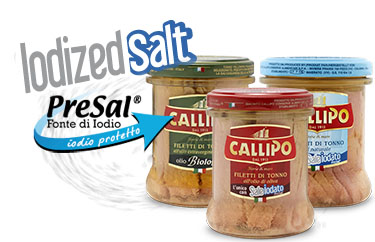
Did you know that...
… Fillets of Callipo Tuna are the only ones with Presal Iodized Salt. Presal Iodized Salt is “protected”, because, thanks to a particular technological process, it keeps the iodine content unchanged even after the cooking and in the food preparations, ensuring its assimilation.

With the Italian regulation n. 55 dated March 21, 2005, the Ministry of Health has promoted specific public health interventions with regards to iodine deficiency.
Ministero della salute
What is iodine?

Iodine is an element (such as oxygen, hydrogen, calcium, etc) widespread in the environment in various chemical forms.
All kinds of marine fauna and vegetation absorb iodine from the seawater and are excellent sources of this mineral.
In particular, good sources of iodine are: deep-water fish, kelp algae, garlic, beans, sesame seeds, soy beans, spinach, chard, white zucchini and turnip tops.
To a lesser extent, iodine is present in the eggs, dairy products, grain and meat.
Anyway, the amount of iodine we take with food, is not enough to ensure a proper daily intake.
What iodine is for?

Iodine is an essential micronutrient present in the human body in small amounts (15-20 mg), concentrated almost exclusively in the thyroid, the endocrine gland located at the base of the neck.
The thyroid produces two hormones (thyroxine or T4 and triiodothyronine or T3) which contain iodine in their chemical structure.
These hormones regulate many metabolic processes in the most of the cells and play an important role in the early stages of the growth and in the development of various organs, especially the brain.
Iodine contributes:
- to the normal growth of the children
- to the normal thyroid function
- to the normal energy metabolism
- to the normal cognitive function
- to the normal functioning of the nervous system
Relevant studies have shown that the average amount taken through a normal diet is not enough to meet the daily iodine requirements.
How much iodine we need?
In order that our thyroid function properly and produce the needed amount of thyroid hormones, it is necessary that everybody – children, teenagers and adults – take the right daily amount of iodine.
The daily amount of iodine that must be taken by a teenager or an adult is 150 micrograms.
Pregnant women and in lactation must take a greater amount of iodine in order to ensure a normal growth of the child.
What is the salt enriched with iodine?
Salt enriched with iodine is a normal table salt mixed with a minute amount of various salts of iodine. Salt enriched with iodine has the same appearance of the table salt, without particular odor or taste. It doesn’t change the taste of the food to which it is added. In order to avoid as much as possible losses of iodine, it is advisable to store it in a cool place, away from light and moisture.
How much iodized salt should we consume?
In addition to the quantity obtained from diet, each gram of iodized salt supplies 30 additional micrograms of iodine – that is 1/5 the quantity of the daily intake necessary for an adult.
It is however necessary to reduce at the same time the usual consumption of salt (sodium chloride); a high intake of sodium increases the risk of cardiovascular diseases, for blood pressure increase and other effects which are not strictly linked to this mechanism.
The best thing to do is using iodized salt, by keeping in mind that we should halve our intakes of salt –currently corresponding to an average of about 10 g a day. This allows us to reach a good balance between taste and prevention of risks linked to the use of sodium.
Might a high consumption of iodine be harmful?
In normal subjects, assuming doses of iodine which are widely superior to those assumed through the normal use of iodine salt are absolutely not dangerous, as the thyroid has a high level adaptation mechanism.
Anyway, particular care shall be given to the use of some food nutritional supplements containing high levels of iodine (usually seaweed-based), as this might lead to an excessive intake.
Can anyone consume iodized salt?
Everyone can consume ionized salt as, by consuming few salt, the quantities of iodine one assumes are anyway much lower than the values above which negative effects arise.
The iniziative of the Ministry of Health
The reduction of the diseases from deficiency of iodine in the diet is a primary purpose for public health of the World Health Organization – WHO – and of the Food and Agriculture Organization (FAO).
In order to reach this goal, the Ministry of Health issued the regulation n°55 dated 21 March 2005, concerning the Dispositions aimed at preventing endemic goiter and other pathologies due to deficiency of iodine, whose aim is to realize monitoring programs of iodine prophylaxis in Italy, and improve the public health system regarding iodine deficiency.
